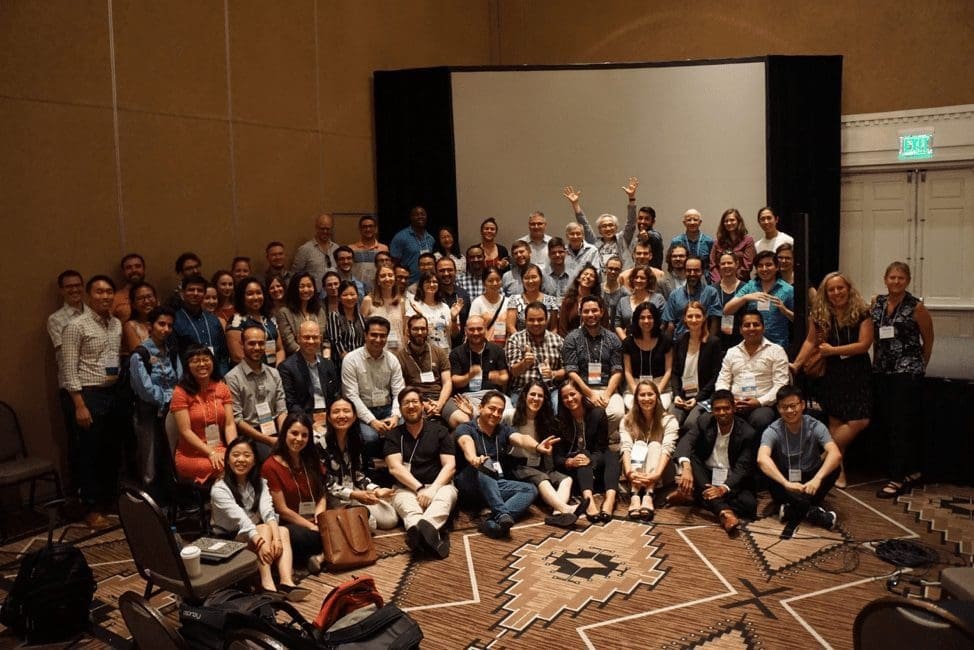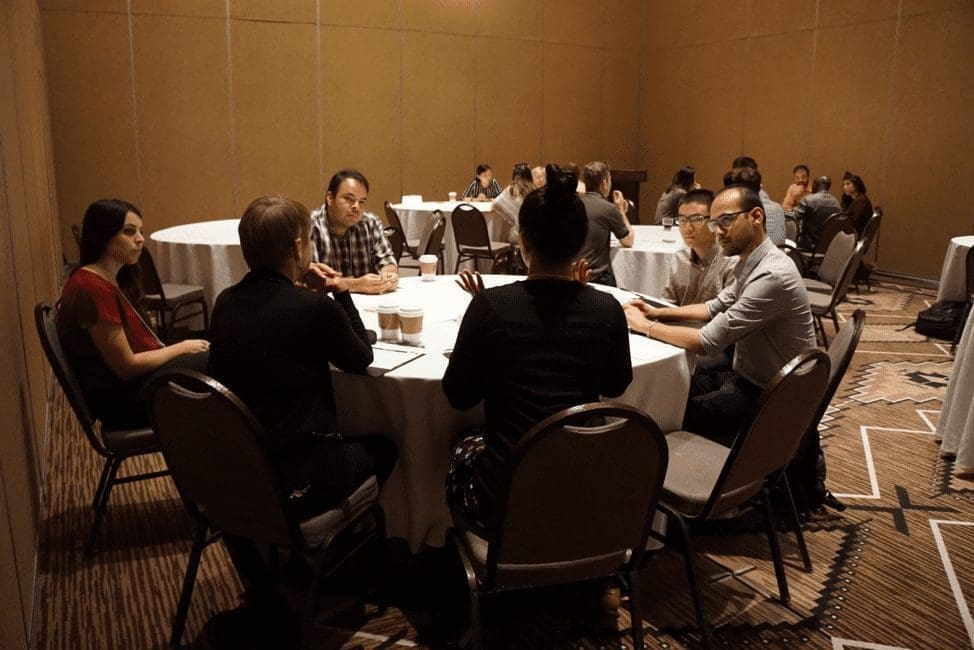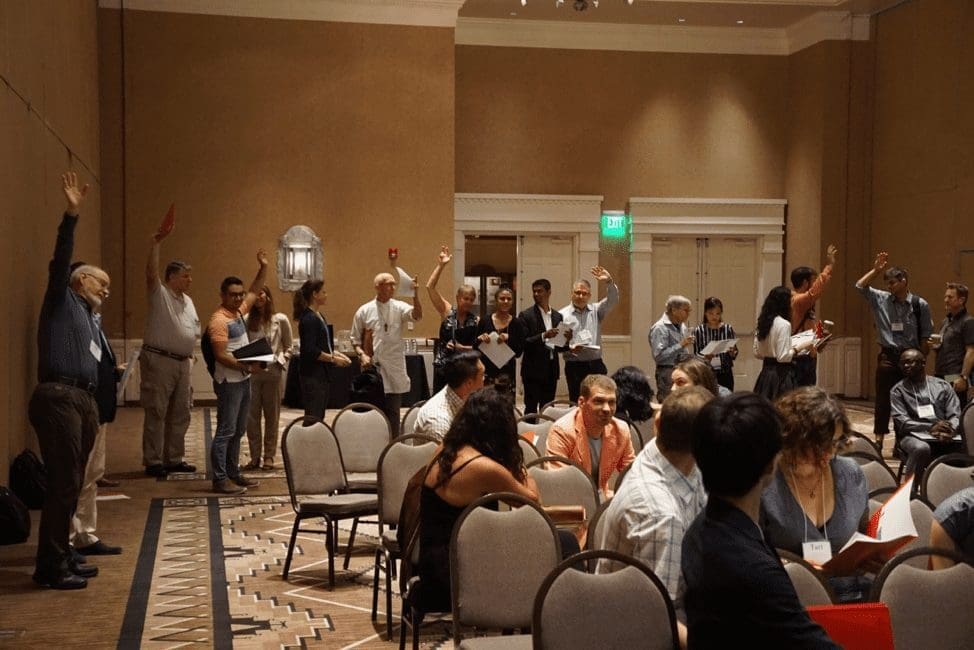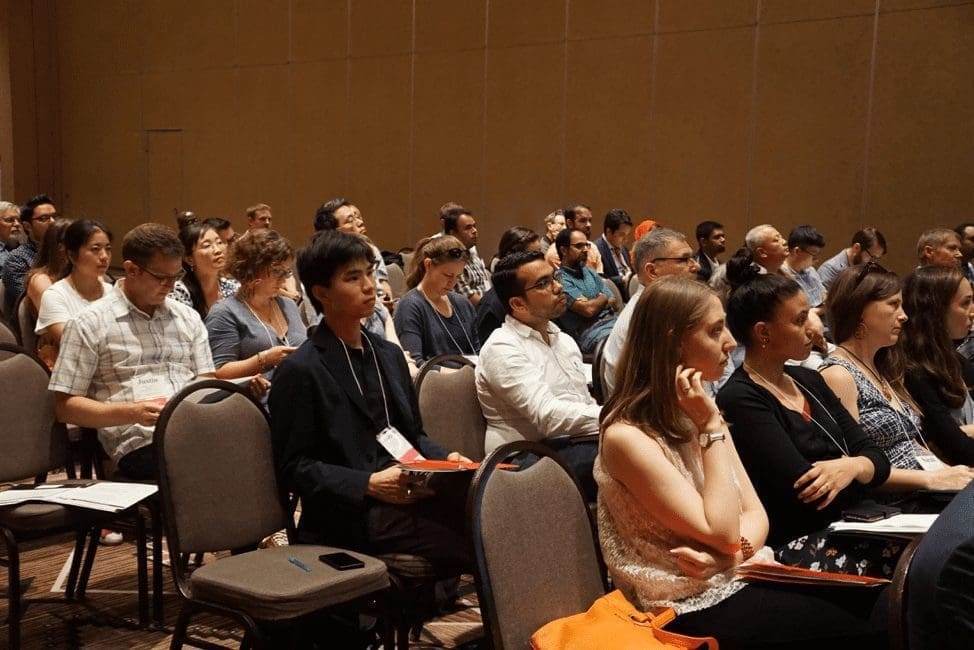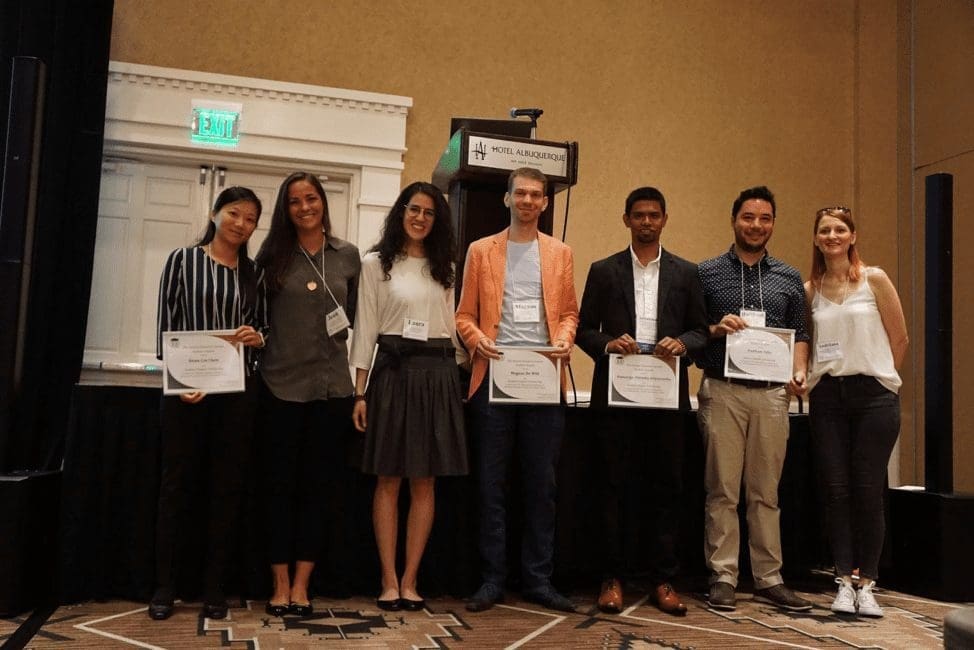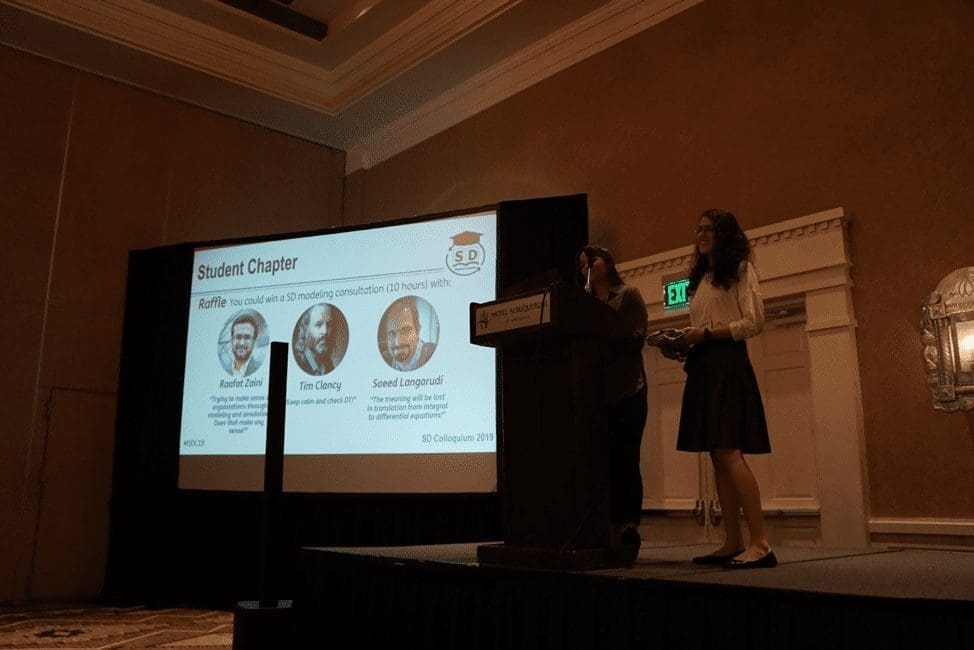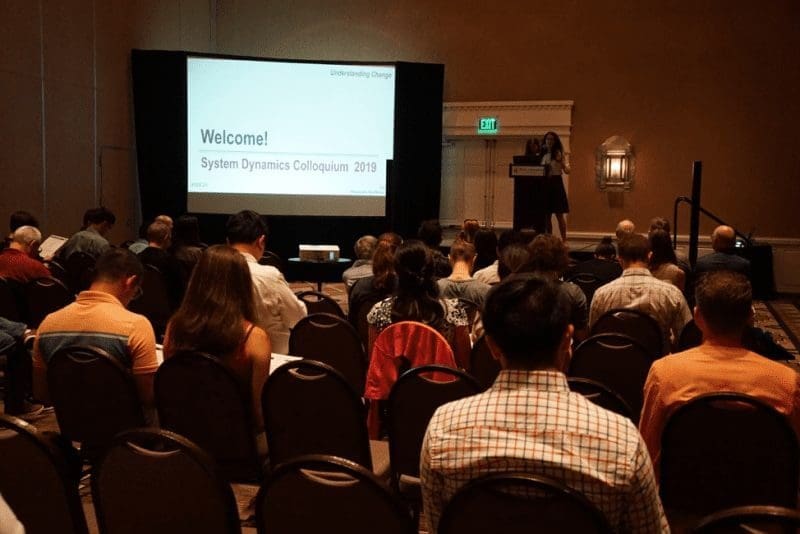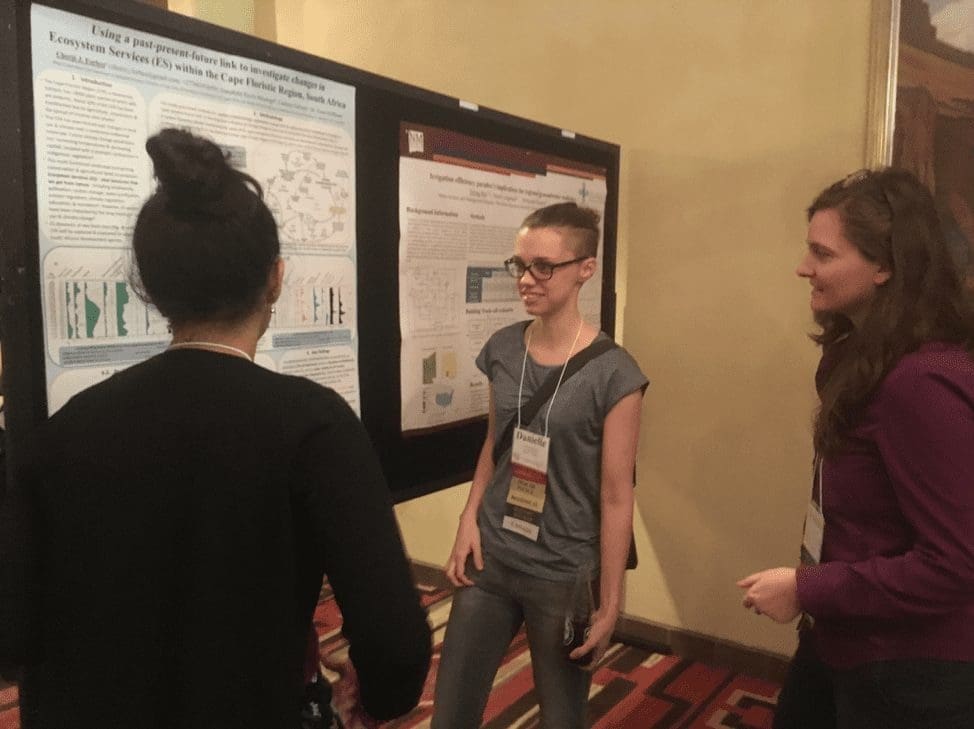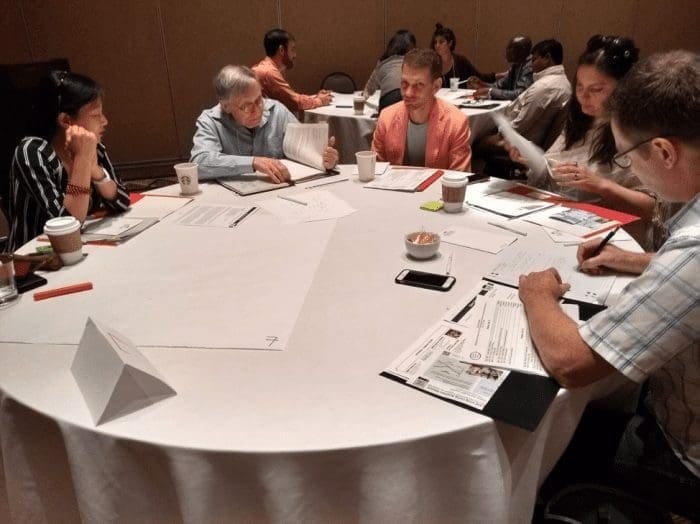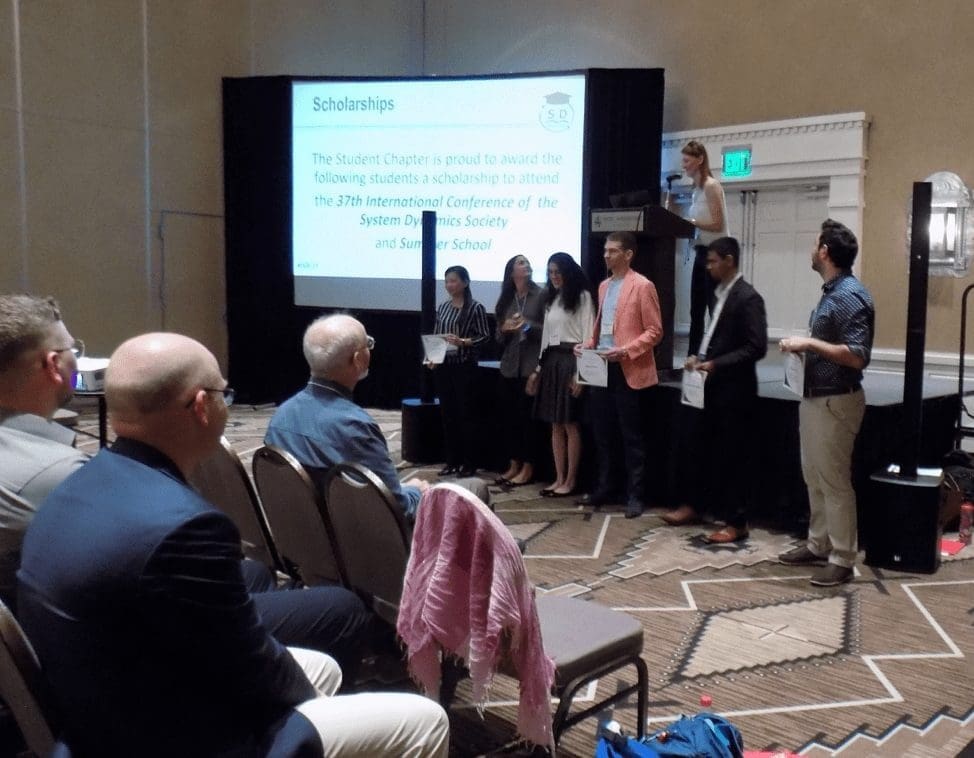Relationships for resilience
July 25, 2021
A free event. Join us!
The Student-organized Colloquium is a free, one-day event organized by the Student Chapter of the System Dynamics Society held on the first day of the International System Dynamics Conference (ISDC). The Student-organized Colloquium promotes dialogue among system dynamicists of varying fields, levels of training, and backgrounds and creates spaces to have meaningful conversations about the topics that we all care about so that everyone can share and receive feedback to improve their work.
The format of the event consists mainly of breakout sessions in which doctoral, masters and undergraduate students, as well as practitioners, professionals, and academics in any field who are new to System Dynamics (less experienced, mentees, juniors), can discuss their ideas and concerns, and get mentored by more experienced system dynamicists (mentors, seniors).
If you have any questions about this event, please contact the System Dynamics Colloquium co-chairs, Braveheart Gillani and Cherie Dirk.

Fundraising event
WARM-UP FOR THE CONFERENCE!
Saturday, July 24th, 2021
10-11 am New York | 3-4 pm London | 10-11 pm Beijing
Can’t make the time? No worries, you can participate anytime within 24 hours after the race.
Can’t run? Feel free to walk, bike, or even row (like AVP Finance Will Glass-Husain). Or even just join in to cheer others on!
Who Should Attend?
All are welcome – undergraduates and post-graduate students, researchers, practitioners, lecturers, professors, retired system dynamicists, etc. A wide range of experiences, applications, methods, and technologies are needed to address the ever-evolving issues facing the world today and therefore we encourage all who are interested in system dynamics to attend this event. The aim of the Student-organized Colloquium is to bring all system dynamicists closer, in order to help us all reflect together on systems and the collective learning process within our global and inclusive System Dynamics community.
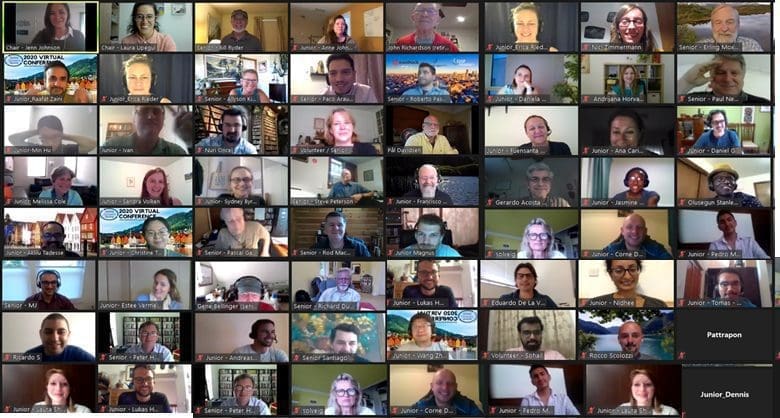
Student-organized Colloquium 2020 – Online
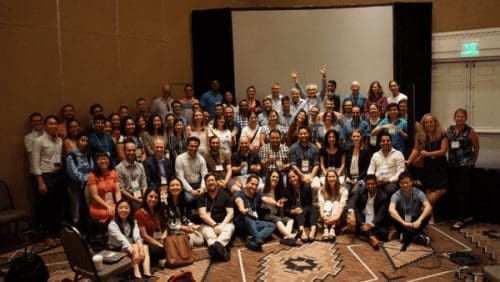
Student-organized Colloquium 2019 – Albuquerque, USA
For Novices
The Student-organized Colloquium strategically takes place on the first day of the ISDC since it is a “soft-landing” for newcomers, enabling interaction with peers and senior system dynamicists before the formal proceedings of the ISDC. The Student-organized Colloquium is an important event where less-experienced system dynamicists (i.e. students and non-students that are new to the system dynamics field) can get feedback on their work, build networks and learn from and alongside one another, in a comfortable environment.
For Experts
Experts in System Dynamics have a lot to offer developing system dynamicists (less experienced, juniors, mentees) and it can be difficult for newcomers to learn from sifting through years of seminal papers. In addition to this, less experienced system dynamicists have many ideas on how to combine new and developing techniques with established practices, and come with fresh eyes that can create novel paths to discover, as well as new concerns to address. We need experienced system dynamicists to help us grow.
2021 Theme: Relationships for Resilience
Schedule – 25 July 2021
The Student-Organized Colloquium 2021 will be hosted virtually using an online conference platform (Zoom) and the general structure will include plenary keynote presentations by more experienced (senior, mentor) and less experienced (junior, mentee) system dynamicists, a live poster session (Angel Advisor Programme) and breakout sessions in smaller groups. The main focus of the day is providing opportunities for less-experienced system dynamicists (i.e. students and non-students that are new to the system dynamics field) to get feedback on their work, build networks and learn from and alongside one another, in a comfortable environment.
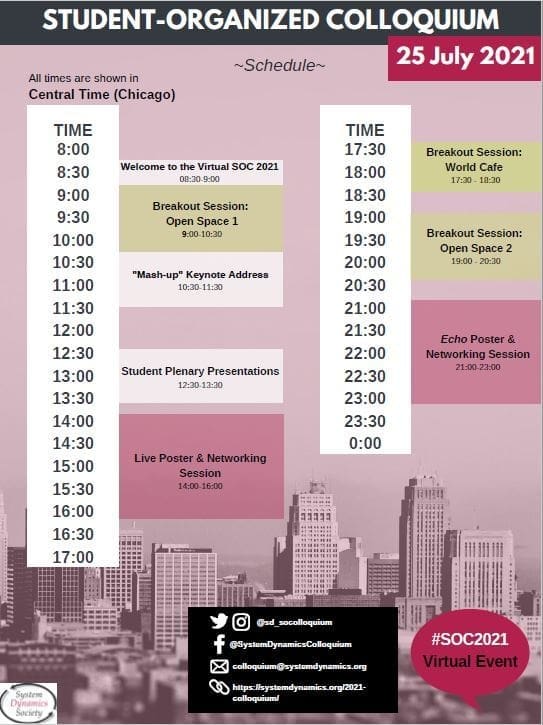
Important Dates
Deadlines for the Student-organized Colloquium are generally the same as the International System Dynamics Conference, with an extra deadline for those wishing to get feedback from their Angel Advisors (see below).
27 January 2021 | Registration and Paper Submissions Open
25 March 2021 | Paper Submissions Due
26 May 2021 | Notification of acceptance
9 June 2021 | Presenter registration deadline
16 June 2021 | Deadline to submit a 2-min introductory video for Angel Advisors to colloquium@systemdynamics.org
8 July 2021 | Deadline to submit your PDF poster, video link, and a brief paragraph to colloquium@systemdynamics.org
24 July 2021 | Fundraising Event (conference warm-up)
25 July 2021 | Student-Organized Colloquium
Plenaries:
Student Presentations: Two students will be selected by the Student-organized Colloquium Organizing Committee to present a 20-minute presentation of their work.
Keynote: A more experienced system dynamicist will be chosen to give a keynote address about their journey in system dynamics and how system dynamics relates to this year’s SD Colloquium theme.
Breakout sessions:
Open Space: Open Space is a fun and informal session where less experienced participants get a chance to talk about their work (successes and challenges) and any System Dynamics related topics while gaining a perspective from more experienced (senior, mentor) system dynamicists. Participants engage in smaller break out groups and get an opportunity to set an agenda of topics they’d like to discuss as a group in the allotted time.
World Café: The World Café session is an adaptation of a well-developed methodology for hosting large group dialogue. Less experienced (junior, mentee) and experienced (senior, mentor) system dynamicists get together in a café-like format to engage in 15-20 min conversations around central topics/questions before moving to a different group with different people. Multiple interactions are encouraged to build on the session before it.
Poster session (Angel Advisor Programme) and Networking:
The poster and networking session allows Student-organized Colloquium participants to enjoy interacting whilst viewing the varied selection of posters presented by less experienced system dynamicists. During this time, poster presenters also meet with their Angel Advisors to get dedicated feedback on their work.
Frequently Asked Questions And Submission Guidelines
2021 Student Organized Colloquium (SOC) Frequently Asked Questions
Why submit to the SOC (Student-Organized Colloquium)?
Different from the regular sessions in the conference, the Student-Organized colloquium provides a forum where students can openly share the challenges they face with modeling and their research, rather than communicate polished results of completed research. Here are just a few reasons to consider submitting your work to the colloquium:
- You are studying at an institution where there are few (or no) faculty engaged in system dynamics work, and you wish to present your work in a friendly setting, make connections with people in the field who can help you, discover available resources and meet potential mentors.
- You have an idea for a research/dissertation proposal and would like feedback (on the conceptualization of the problem, the suitability of System Dynamics, appropriate next steps, feasibility, etc.).
- You are in the middle stages of your research and modeling (i.e., the work is not yet ready to present at the general ISDC) and would like feedback on work to date, help getting un-stuck, advice on next steps, or perspectives on the research contributions from people outside your department.
- You are nearing completion of the project/dissertation and are seeking critical feedback and questions to improve the scholarly and practical contributions and implications of your work.
- You want a chance to work in small groups with senior system dynamicists to develop your project ideas.
Who can submit to the SOC (Student-Organized Colloquium)?
The majority of submissions come from doctoral students; however, exceptional work from undergraduates and master’s students is also reviewed.
Who can attend SOC (Student-Organized Colloquium)?
All are welcome to attend the Colloquium. Pre-registration is kindly encouraged since by doing so, we can estimate the resources required in the virtual meeting place.
How are plenaries chosen?
Students whose submissions with subsequent expert feedback would benefit the larger audience of Colloquium attendees will be invited to present their work in plenary presentations. These submissions may reflect a problem or question that was observed in several submissions or are commonly experienced by SD students and/or they may demonstrate exceptional modeling, research design, and/or innovative application areas. Emphasis will be on the clarity and quality of the work and its potential for informing many others’ learning.
What kind of feedback can I expect from participating in SOC (Student-Organized Colloquium)?
Plenary presenters will receive informal feedback from the Colloquium attendees in a 10-minute period following their 20-minute oral presentation. Students whose submissions are accepted as posters will have the opportunity to share their work with conference and Colloquium attendees during the poster session. In addition to feedback from those in attendance, students making an informal 1-2 minute “my work and me” video will also be assigned an expert advisor who will closely review their work in order to better offer constructive and friendly feedback during the poster session, in addition to other informal feedback from those in attendance.
Do I need to attend the International System Dynamics Conference to present at the SD Colloquium?
No, you do not need to attend for the System Dynamics Conference, though we do highly recommend it. There is no financial cost for the colloquium.
Do I need to register for the International System Dynamics Conference to present at the SD Colloquium?
No, you do not need to register for the International System Dynamics Conference to present at the SD Colloquium though we do highly recommend it.
What are the submission guidelines?
Submission guidelines are provided in a separate document titled “Step by Step Submission Details.”
2021 Student-Organized Colloquium Requirements
There are three formats acceptable for submission: full papers, extended abstracts, and posters.
Note: Colloquium reviews are not blind. Please include all author information on your submitted work.
Full Paper
Suggested length 10-20 pages (single-spaced)
Full papers are more appropriate for work that is in progress and might be thought of as an intermediate progress report of the research. These papers are expected to provide a deeper discussion about the current status of the study and the preliminary findings. Depending on the type of research, this may include a detailed discussion of the model structure and preliminary output, or the setup used in group model building sessions, etc., for example. Full papers do not need to be completed research but need to have a substantial amount of progress completed in order to have a robust discussion section.
Full papers must contain the following sections.
- Introductions
- Background
- Methods
- Discussion/Analysis
- Results
Full papers will be considered for plenaries or posters.
Extended Abstract
Suggested length 2 pages (single-spaced)
This alternative is especially useful for students in the early stages of research or in the proposal stage. The purpose of submissions in this format is to receive feedback on the conceptualization of the problem and proposed work, relevance, and contribution of SD, the feasibility of the scope of work, insight into the next steps, etc.
Extended Abstracts must contain
- Introduction/ Problem Statement
- Background
- Current Status
- Next Steps
Extended Abstracts will be considered for posters.
poster
Poster presentations are an interactive format in which the authors stand near a poster presenting their work and discuss it with one or two conference attendees at a time. There can be one or more times devoted to poster presentations, and there are no other activities at the time of poster presentations. Posters can include completed projects or work that you are seeking feedback on.
Formatting Requirements for All Submissions
To aid the review process, we ask that students follow the general guidelines provided below for all submissions:
-Single-spaced
-3 cm margins all around
-12-pt Times font or some equivalent
–Clear figures, tables, graphs
-Prose edited to eliminate typos and increase clarity
Poster submission format
Poster submissions should be in the form of a full poster that describes the dynamic problem or issue being addressed, the approach being used to address it, the current progress, results and findings, and concluding messages. Works cited should also be included.
Please provide a 1920 X 1180 high-quality PDF for your main poster format. The top of the poster must include the TITLE, AUTHOR(S), and INSTITUTION(S). Recommend title lettering to be 60+ clearly readable font. Author(s) is responsible for all titles and headings. The poster should be self-explanatory, simple, and specific, presenting material in a logical, legible manner. Introduction, written material, photos, charts, and graphs should be in a sequential fashion, and trademarks must be indicated where appropriate. Include references. A disclaimer may be posted to indicate that, “results and/or modifications are in preparation for publication and cannot be used without permission of the author(s).”
Content and Sequence Suggestions for All Submissions
- Introduce the problem and describe its relevance
- Describe previous work done in the field (i.e., how this problem has been addressed before in other fields, or how the field of has viewed this problem in the past, etc.)
- Discuss how the problem is an appropriate problem to address using SD or why it is relevant to the field
- Present your research question(s) and aim(s)
- Describe the potential contribution of your work or proposed work (i.e., what contribution can SD make, how this work can improve how SD is practiced, etc.)
- Describe the work you plan to do and how you plan to do it(or have already been proceeding).
For those presenting work on which significant progress has been made, describe the work you have already done, and consider addressing some of the following questions:
- What are the dynamics of the problem you are trying to understand and/or address?
- What are the model boundaries?
- What initial structures do you have and why is that a useful way to conceptualize the problem?
- What is your dynamic hypothesis?
- What model insights are you aiming to generate from your work?
- What are some of the major feedback loops in your model(s)?
- What/who are your data sources?
- What variables are endogenous, exogenous, and not included in your model?
- What current behavior modes is your model producing?
- What policies are you testing?
- What steps are you taking to build confidence in your model?
- What insights did you gain about the problem in the modeling process?
- What conclusions can you draw from your work at this time?
Planning Team
A big part of the logistics and the general design and execution of the event is only possible thanks to the help of our team of volunteers. If you want to contribute with ideas, time or any type of effort (both before the Colloquium and the day of), please contact the Student-organized Colloquium co-chairs, Braveheart Gillani and Cherie Dirk. It is also an amazing opportunity to meet people from all over the world and have a lot of fun.
Angel Advisor
All successful Student-organized Colloquium poster/paper applicants who are invited to present get a chance to be a part of the Angel Advisor Programme. It involves matching the presenter (a generally less experienced, junior system dynamicist) and an experienced (senior, mentor) system dynamicist according to research areas. Before the Student-organized Colloquium, the senior will review the presenter’s paper/poster (this may also include specific System Dynamics questions). The presenter and the senior get an opportunity to meet and discuss the work. The Angel Advisor Programme provides a unique opportunity for constructive criticism and modelling advice from an expert. This programme has been working since 2015 and we hope we can get more senior system dynamicists involved each year.
Gallery
See pictures from past events

